REVIEW – Thymesia is the latest Soulslike game to tempt fans with gameplay that uses the usual reflexes, challenging combat and faithful application of the genre’s rules, a grim world and a dark fantasy story featuring a medieval population plagued by a plague. But does Thymesia bring enough newness to this Soulslike, or is it just a wannabe Bloodborne copy?
Soulslike is a strange genre. What was once attributed to a single studio making a single type of game has now grown into a genre of its own, with happy-go-lucky companies diving into its development like there’s no tomorrow?
Developed by OverBorder Studio and published by Team17, Thymesia is a new take on this well-known genre in a grippingly atmospheric world. It generated quite a buzz before its release, especially with its demo released on Steam earlier this year. Gamers were impressed by the demo version’s atmospheric art style, smooth animations and dynamic, fast-paced, spectacular combat. But what did the final game look like?
Not just a “soulless” copy-paste
While Thymesia can’t deny that it’s another Soulslike, it’s still an excellent title for the familiar Souls genre. It succeeds in perhaps the most crucial area: it’s fun to fight in, and it’s not infuriating when you die over and over again. Also, it’s a solid positive that it’s not just a copy-and-paste game. The combat, for example, has enough innovation to make it worth sitting down in front of it because it tests your reflexes differently from what you’re used to in Soulslike. Sure, there are plenty of familiar touches, but this dark fantasy action-adventure is worth diving into if you like the genre and appreciate the nuances between games.
However, when you look at aspects outside of the truly professional combat system and dynamics, cracks start to appear in what initially seems to be a substantial “edifice”. Unfortunately, enemies, a disappointing lack of variety in levels, a general lack of challenge, several technical glitches and the developer’s confused expectations drag down Thymesia, some elements of which feel difficult in the wrong way. They are not ‘challenging’ and simply frustrating – or worse, tedious.
Memories and mistakes
Thymesia is set in the Kingdom of Hermes, a place that has been devastated by a terrible plague. The disease turns people into monsters and spares no one, destroying beggars and kings alike. You play a man named Corvus: a mysterious figure dressed in black, wearing a medieval medical mask and seemingly immune to the plague’s destructive effects.
In the role of Corvus, you’ll have to fight your way through 3 different big maps, each representing a different place in the kingdom and drawing on your own memories. By defeating bosses and finding the stories scattered throughout each level, your goal is to remember how to create an alchemical device called “Hermes’ Answer” that might be able to cure the plague once and for all. So you must fight to recover the lost knowledge and, in the process, find out what has happened to the world and whether you can save it.
A messy story, an undeveloped universe
So the concept is exciting and full of interesting ideas, but unfortunately, the game lacks something “extra” that would make Thymesia really captivating.
One of the main problems is the game’s somewhat chaotic universe, full of far more questions than answers. For example, you only get a very brief explanation of what you’re doing: who are you, what caused the outbreak, why are you here? The answer is often buried between the “lore” and the optional but immensely meaningless dialogue. You have to search for Corvus’s memories, but that’s also explained in a terse way, and anyway, the whole “memory loss” thing doesn’t make much sense. So there is no immediate connection between the protagonist, his role in the game universe and the player. I felt the same problem with the much-heralded Elden Rings; only it is even more pronounced here. And yet, if I’m not interested in Hermes’ world for once, why should I feel the urge to save it?
One of the main characters in the story revolves around Aismey, a “firebrand” type character. You will find the story’s significant “bits and pieces” to show him. He will help you with his unique insights and perspectives, trying to deepen the game’s world and the related story. Although he sometimes says something interesting, it is not enough to help the dull story.
In addition to Aismey, there is another NPC you meet a little later who adds to the game’s universe in new dialogues, giving a different perspective to Aismey. He’s a cool one, but this NPC is so hard to find most of the time that you often forget to revisit him. (I even forgot his name.)
Overall, the story is not bad, just terribly uncharacteristic. If you were hoping for a deeper plot than you need, you’d have to look elsewhere. It should be added that story is never an essential part of a Soulslik, and in this respect, Thymeisa’s well-crafted tale serves its purpose, but nothing more. It merely gives you an excuse for the usual action-RPG gameplay to visit nice-looking environments where you can fight for a while. Then it directs you to other areas and other enemies and bosses, but that’s all you should expect.
Let’s all quickly add that the game has 47 different endings, 5 of which are entirely unique. That sounds good, but it still doesn’t save the uncharacteristic story.
Developers “stole from the good” in combat.
Well-developed combat is the aspect of the game where Thymesia really shines.
Thymesia’s combat is more like Bloodborne or Sekiro than Dark Souls: frenetic, fast and risky. Instead of a more tactical and slower approach, Thymesia favours aggressive play, which makes for a more dynamic and enjoyable experience. Sooner or later, you’ll realise it’s worth the risk of getting wounded because you’ll heal back up once you’ve executed the enemy, making the damage worth the risk. This system works really well and is more engaging than many other Soulslike.
I should note that I tested Thymesia on PlayStation 5. While it didn’t take advantage of the extra DualSense capabilities, it was still a joy to control Corvus with the PS5 controller. Although I didn’t play the PC version, I’ve heard that the keyboard/mouse combo is also outstanding.
When you deal damage with your sword, you exhaust the enemy’s HP. However, if you only exhaust one part of their HP bar, the other part becomes visible underneath – this is the “real” damage. If you don’t attack again within a set time, the wound will start to heal. If Corvus uses a special claw attack on these wounds, it will drain the other health bar so you can kill the enemy. Virtually all enemies have two health bars, one to be taken down with sword strikes and one to be bled with claw attacks.
Plague Weapons
The other system is the system of plague weapons. With the Claw, you can rip out the essence of the enemy. This essence manifests as a “Plague Weapon” – a one-time use attack that takes on the attributes of the enemy you stole it from. For example, if my opponent is an enemy with an axe, and I steal his Plague Weapon, I can use that axe in a special one-time attack where Corvus leaps into the air and slams it back to the ground. These attacks can’t be stopped once activated, so you’ll have to master them and learn when to use them at the right time and rhythm.
You can collect more than twenty plague weapons; some are exclusively available from bosses. There are also collectable “weapon pieces”: collect enough pieces of a particular type, and you can permanently unlock that plague weapon for continuous use. Both features together mean that you can use both permanently acquired weapons in combat and weapons for one-time use only. This will spice up battles at all levels, especially group encounters where you can receive many different plague weapons.
Both are excellent systems that renew the previous ones. The Plague Weapons system is much like the “prosthetics” in Sekiro, but I used the former more because it was much more manageable and thoroughly spiced up every fight I used it in.
There’s also a skill tree, a new addition to FromSoftware’s titles. There are skills from every aspect of combat: sabre attacks, feather attacks, dodges, parries, etc. You can choose a lot of different abilities from these, all of which can be reset and re-selected at any time, at no cost to you, to test whether you like them or not. If you don’t want one, no problem, just reset it, and you can choose another – another very sympathetic developer move. There’s plenty to try here to tailor Thymesia to your own preferred style of play.
A series of missed opportunities, but the overall picture is pleasant
Ultimately, Thymesia is a good game; it’s a pity that it is dragged down by many little things that prevent it from becoming excellent, even though it came close. I wish there were more enemies, I wish there were more to explore, I wish the story were clearer – and I could go on and on with a list of minor annoyances.
However, I still say that if you like this genre, don’t miss it. The graphics are pleasing (if not groundbreaking), and the difficulty level is friendly for the genre, making it accessible for those who don’t have the ninja reflexes that FromSoftware titles require.
Thymesia is a pleasant Soulslike, which, due to its minor shortcomings, can’t match FromSoftware’s titles. While not too difficult, it offers an innovative combat experience reminiscent of classics such as Bloodborne and Sekiro. Once you get used to and accept the somewhat lacking universe and story, the lack of enemy variety and the uniform map design, Thymesia has the right “spirit”.
-BadSector-
Pro:
+ Unique, well-developed, pleasant Souls-like combat
+ Fun boss fights
+ Nice graphics
Contra:
– Same enemies and level design all the way
– The universe and the story are relatively weak sauce
– Minor and major bugs and some bad developer decisions
Publisher: Team17
Developer: OverBorder Studio
Style: Soulslike action RPG
Release: August 18, 2022.
Thymesia
Gameplay - 7.8
Graphics - 8.2
Story - 6.4
Music/Audio - 7.2
Ambience - 7.8
7.5
GOOD
Thymesia is a pleasant Soulslike, which, due to its minor shortcomings, can't match FromSoftware's titles. While not too difficult, it offers an innovative combat experience reminiscent of classics such as Bloodborne and Sekiro. Once you get used to and accept the somewhat lacking universe and story, the lack of enemy variety and the uniform map design, Thymesia has the right "spirit".

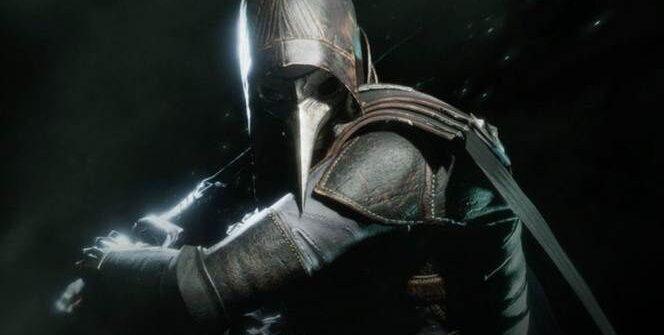
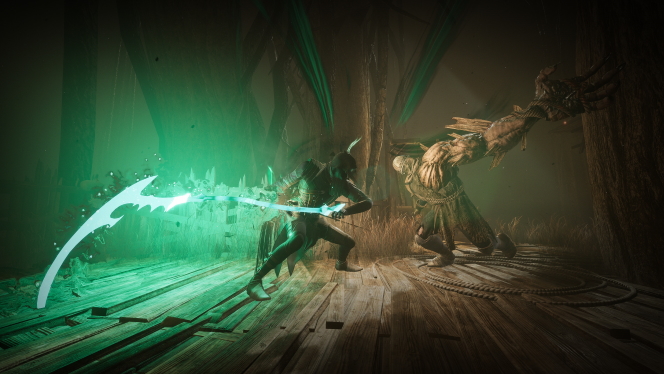
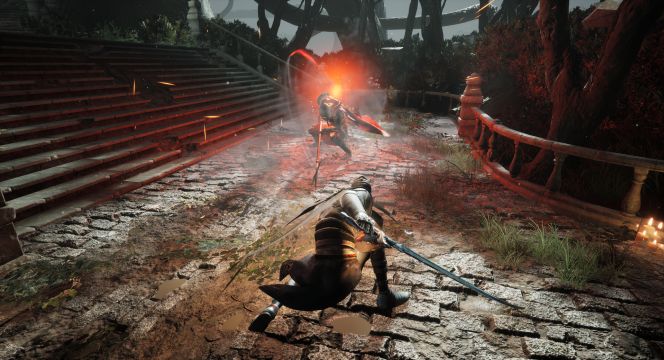
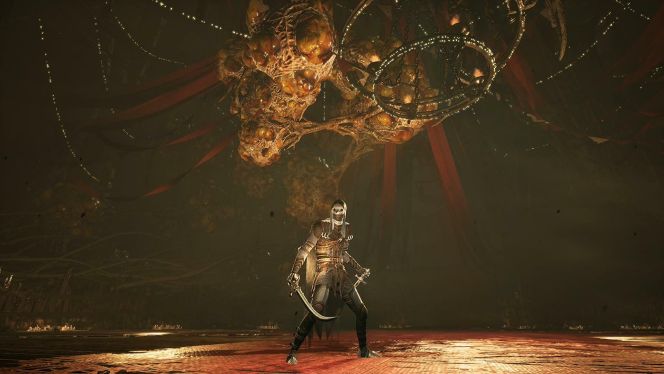
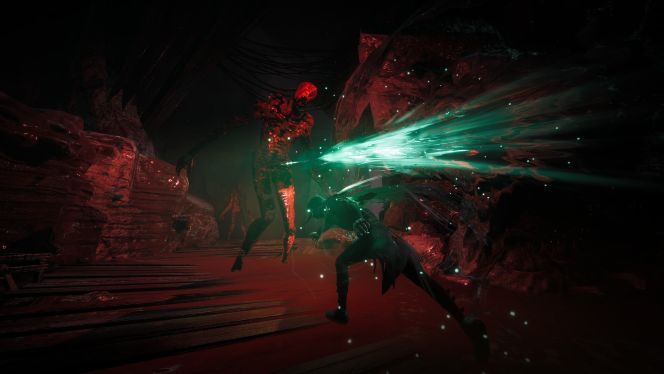
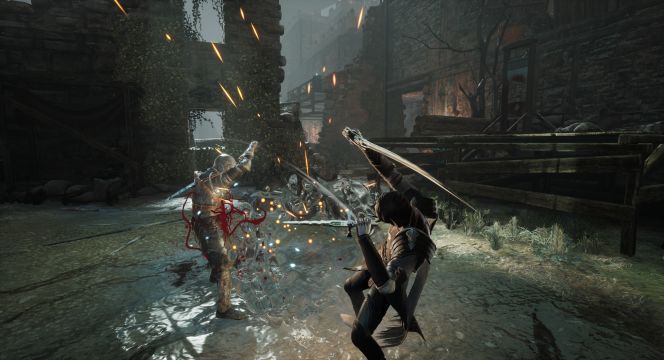
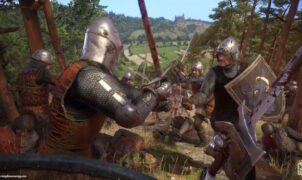





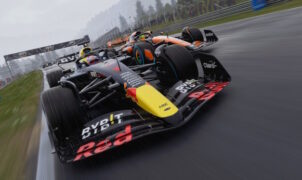

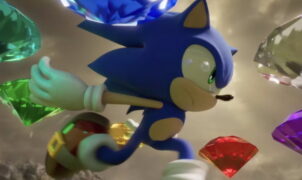


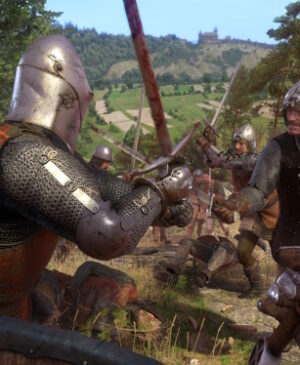

Leave a Reply